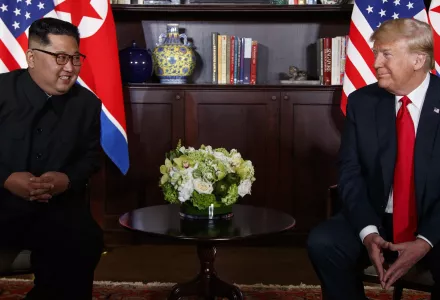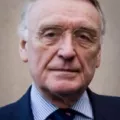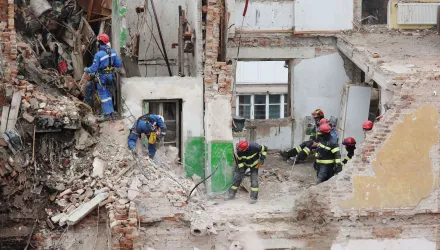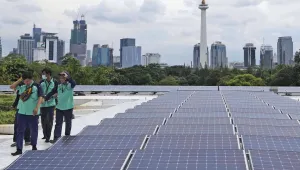
Europeans share the world-wide relief that after apocalyptic threats of war the Singapore summit between President Trump and Kim Jong-un has dramatically lowered tensions on the Korean Peninsula and thus for the time being avoided a conflict that would have horrible consequences for Koreans, Japanese and Americans, indeed for the entire world. Diplomacy is back and both sides are now committed to negotiations toward an agreement on peace and the denuclearization of North Korea.
Nonetheless, the summit has caused a triple shock in Europe. The first was triggered by the unbalanced outcome. President Trump granted Kim, the dictator of probably the worst repressive regime on the planet, the summit pageantry of a meeting thus bestowing the legitimacy of equal status, which all his predecessors had refused for good reasons. Of course, the Europeans did not fail to notice the difference between Trump’s praise of the dictator and the personal insults toward close allies and his continuing destruction of the multilateral rules that tie the US to Europe. At the same time Trump received only vague assurances from Kim - even less than earlier US Presidents - while conceding to suspend military exercises in Korea.
Second, Europeans are shocked by the contrast between this sparse agreement and the nuclear deal with Iran that they had carefully crafted in years of negotiations with China, Russia and the US, which Trump has denounced as the worst deal ever and withdrawn from. Whereas the Iran deal contains firm commitments such as removal of fissile material and equipment, time tables, intrusive inspection by the IAEA, the agreement with North Korea has none of that - only a vague commitment to completely denuclearize, not even the “complete, verifiable and irreversible denuclearization”, that the Administration had insisted on until immediately before the summit.
To withdraw from a verifiable international denuclearization agreement endorsed by the UN Security Council and to conclude another with North Korea based exclusively on promises is incomprehensible to Europeans.
The US Administration’s further withdrawal from America’s role as leader of the West has created the third shock wave. Besides again embracing a dictator while antagonizing democratic allies, Trump’s concession to abandon “provocative war games “in the area and even to contemplate a potential withdrawal of US troops from Korea gives a long-desired gift to a rising China and undermines the alliance with South Korea and Japan as well as the stabilizing role of the US in the Pacific. To Europeans this appears equivalent to Trump promising Putin the suspension of NATO maneuvers and a potential withdrawal from Europe in exchange for Russian promises to disarm.
To Europeans the Singapore summit has given some hope that nuclear arms control if not disarmament may eventually be reached. Ending the “fire and fury” approach will no doubt be helpful but a return to the proven instruments of arms control such as precise commitments, time tables, and intrusive verification, preferably by the IAEA, will now be necessary. Europeans who have a profound interest in preserving the global non-proliferation system possess little means to affect this process but will surely give any support possible through international diplomacy and their membership in the IAEA.
At the same time the summit has been a powerful wake-up call: faced with America’s withdrawal from Western principles and global leadership Europe must make a greater effort to take its fate in its own hand by renewing efforts to overcome internal division and mobilizing greater resources for defense and a global role.
Kaiser, Karl. “The Singapore Summit: Relief and Triple Shock.” METRO U.N., June 20, 2018




